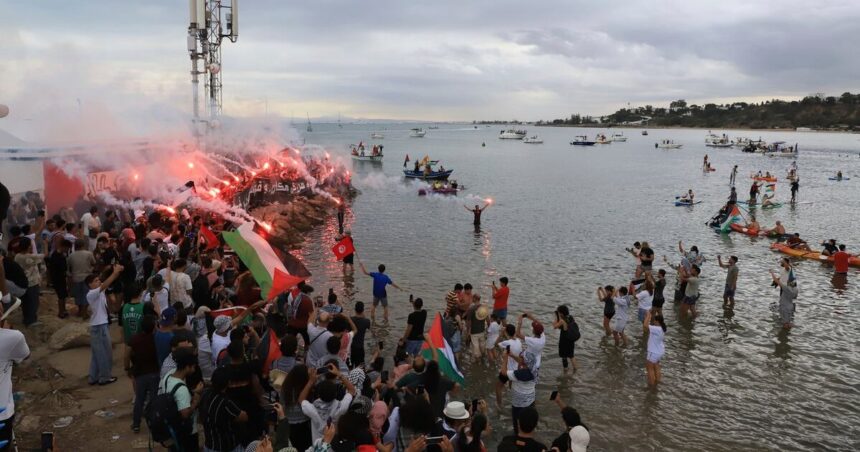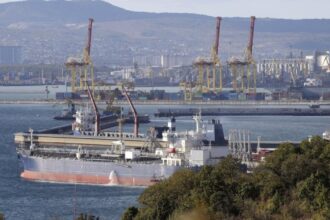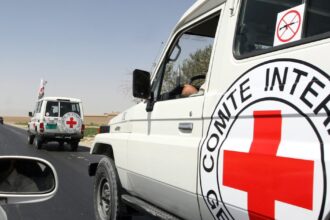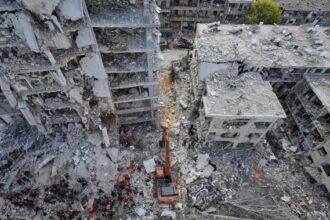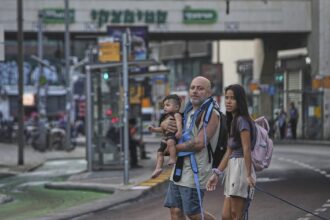In what appears to be an alarming escalation of tensions surrounding humanitarian efforts to Gaza, a flotilla carrying aid supplies was reportedly attacked by multiple drones while navigating waters near Greece early Tuesday. The incident has raised serious concerns about the safety of humanitarian missions and the increasingly volatile nature of the Israel-Hamas conflict.
The flotilla, organized by the Freedom Flotilla Coalition and carrying approximately 5,000 tons of desperately needed food and medical supplies, was targeted approximately 50 nautical miles off the coast of Crete according to activists aboard the vessels. Witnesses report that the drones appeared suddenly in the pre-dawn darkness, hovering menacingly before launching what they described as a “coordinated attack” on the lead ship.
“We were awakened by explosions and the sound of drones circling overhead,” said Maria Petersen, an international aid worker aboard the flagship vessel. “There was panic everywhere as we tried to understand what was happening. The attack seemed precisely calculated to disable our navigation systems without sinking the ships.”
The flotilla consists of three ships named “Freedom,” “Hope,” and “Dignity,” which departed from Turkish ports last week with the stated mission of breaking the Israeli naval blockade of Gaza to deliver critical humanitarian supplies. The coalition behind the mission includes organizations from more than 30 countries who maintain that the blockade constitutes collective punishment of Gaza’s civilian population.
Greek maritime authorities have launched an investigation into the incident, though they have not yet confirmed the source of the alleged attack. “We are treating this as a serious security breach in Greek territorial waters,” said Admiral Nikolaos Papadakis of the Hellenic Coast Guard. “Our primary concern is the safety of all civilians at sea, regardless of their destination or mission.”
The Israeli government has not directly commented on the specific incident, though in previous statements regarding the flotilla, officials maintained that established channels exist for humanitarian aid delivery to Gaza through designated checkpoints. “We cannot comment on specific security operations, but Israel remains committed to preventing arms smuggling while facilitating legitimate humanitarian assistance,” said an Israeli Foreign Ministry spokesperson when asked about the general mission.
International reaction has been swift, with the UN Secretary-General calling for a full investigation into the attack. “Humanitarian missions must be protected under international law,” the statement read. “Any deliberate targeting of civilian vessels delivering aid constitutes a serious violation that demands accountability.”
This incident comes amid growing international concern about the humanitarian crisis in Gaza, where the World Health Organization reports critical shortages of food, medicine, and clean water following months of conflict. Recent political discussions have focused on finding sustainable solutions for aid delivery while addressing security concerns.
The Freedom Flotilla Coalition has a contentious history of attempting to breach the blockade. A similar mission in 2010 ended in tragedy when Israeli commandos boarded a Turkish vessel, resulting in the deaths of ten activists. This latest incident represents the first reported drone attack on such a mission.
Maritime law experts note that attacks on civilian vessels in international waters raise profound legal questions. “Even in conflict zones, there are established protocols for intercepting suspicious vessels that don’t involve armed attacks without warning,” said Professor Eleanor Hammond of the International Maritime Law Institute. “If verified, this incident potentially violates multiple international conventions.”
Despite the attack, organizers report that the flotilla remains seaworthy and intends to continue its journey toward Gaza, though they have implemented additional security measures and altered their course. “Our mission is humanitarian, not political,” insisted flotilla coordinator James Marston. “The people of Gaza are in desperate need, and we remain committed to delivering this aid despite the dangers.”
As tensions in the Middle East continue to escalate, this maritime incident highlights the complex intersection of humanitarian aid, security concerns, and international law. The question remains: in a conflict where even humanitarian missions become targets, how can the international community ensure that essential aid reaches civilians caught in the crossfire?

